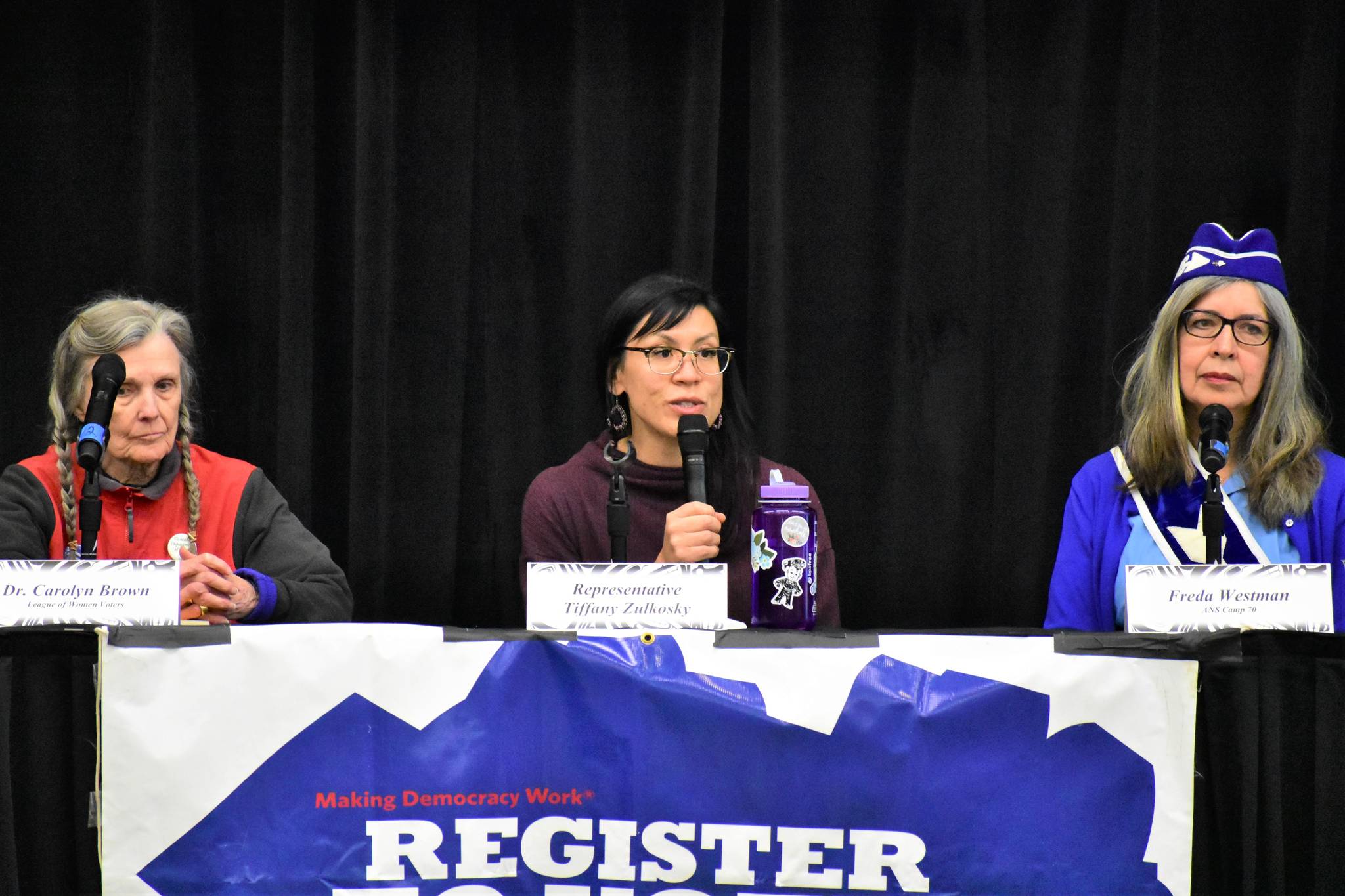Rep. Tiffany Zulkosky, D-Bethel, became emotional Monday as she spoke to a the crowd of about 100 about her experiences in the Alaska Legislature.
“We’ve made so much progress in 75 years,” she said, referring to the passage of the 1945 Anti-Discrimination Act which prohibited racial discrimination in the state.
“But sometimes in that building, you would never know the difference,” she said of the Capitol.
Speaking at a gathering at Elizabeth Peratrovich Hall for a Native Issues Forum, Zulkosky said she often had to sit by fellow lawmakers who made what she considered to be derisive remarks about Alaska Natives.
It can be difficult, Zulkosky said, “when you’re sitting in committee next to people who say thing’s like ‘those people who choose to live in rural Alaska.’ ”
Zulkosky didn’t mention any legislators by name, but she like other Alaska Natives have expressed anger at legislators who have said living in rural Alaska is a choice. But many of those rural communities are ancestral homelands that have been occupied by Alaska Natives for thousands of years, Zulkosky said, and having to continually remind people of that can be stressful.
“While we’ve made progress, there continues to be somewhat of a gap in understanding the role that Alaska Native people have played in this place traditionally since time immemorial,” she said. “It’s really difficult work for tribes and Alaska Native people to continue to educate people, educate policy makers and who carry the burden to ensure that Alaskans as a state are taken care of.”
Monday’s Native Issues Forum began with the screening of a film about Elizabeth Peratrovich and the passage of the 1945 law. The film, “For the Rights of All: Ending Jim Crowe in Alaska” by Jeffry Silverman is part documentary, part dramatization, with actors re-creating the debate over the bill.
After the film, Zulkosky was joined in a panel by Freda Kaagaantaan Westman, council member for Camp 70 of the Alaska Native Sisterhood and Dr. carolyn Brown of the League of Women voters.
Brown talked about her and the League’s efforts to get copies of the film, as well as copies of the book “Fighter in Velvet Gloves,” by author Annie Boochever into every Alaska high school. The film and Boochever’s book tell Peratrovich’s life story, which according to Brown, “we have to keep telling this story, we must, we must, we must, carry on.”
In her address to the crowd, Westman said the best way to honor Peratrovich’s legacy was by showing up. Taking part in political action was good she said, but also being active in the community such as local schools.
“One of the issues that is always present is racial discrimination in our communities, but we can make a difference,” she said. “We have to hold those people in leadership positions accountable to what will make our lives better.”
Westman described the lack of ferry service in Southeast Alaska as something that demanded immediate attention. Westman even went so far as to call the situation surrounding the ferries “genocidal.”
“Even discriminatory practices that are not intended can be racist, can be genocidal,” Westman told the Empire in an interview. “These are Alaska Native villages, and so when the food supply is cut off, when the medicine supply is cut off, it starts to look like an elimination of a people.”
Alaska Native Brotherhood Grand President Heather Gurko agreed with Westman’s assessment, citing the United Nations’ definition of genocide which lists “causing serious bodily or mental harm to members of the group” as a component of genocide.
“It’s disconnecting people from their communities,” Gurko said of the ferry situation. “Our people are disconnected from their communities and our people are saying that this is an act of genocide. It is a continuation of a pattern that has been happening to our people for hundreds of years.”
• Contact reporter Peter Segall at 523-2228 or psegall@juneauempire.com.

